Exploring ICT's Impact on Learning and Teaching Practices Today
VerifiedAdded on 2021/06/17
|7
|1940
|64
Essay
AI Summary
This essay explores the holistic integration of Information and Communication Technology (ICT) in schools, emphasizing its impact on teaching and learning practices from a sociocultural perspective. It highlights how ICT serves as a mediational tool, shaping learning environments and necessitating pedagogical changes. The essay discusses the importance of understanding the cultural and historical context of ICT tools, and how their effectiveness depends on their utilization within the learning environment. It also references Singapore's successful ICT master plan as an example of effective technology integration in education. The study emphasizes the need for an open approach to ICT in education, where its benefits are clearly understood and accessible to both students and teachers. The essay concludes by advocating for a framework that analyzes ICT's role within the broader ecological system of education, promoting a comprehensive understanding of its impact on learning.
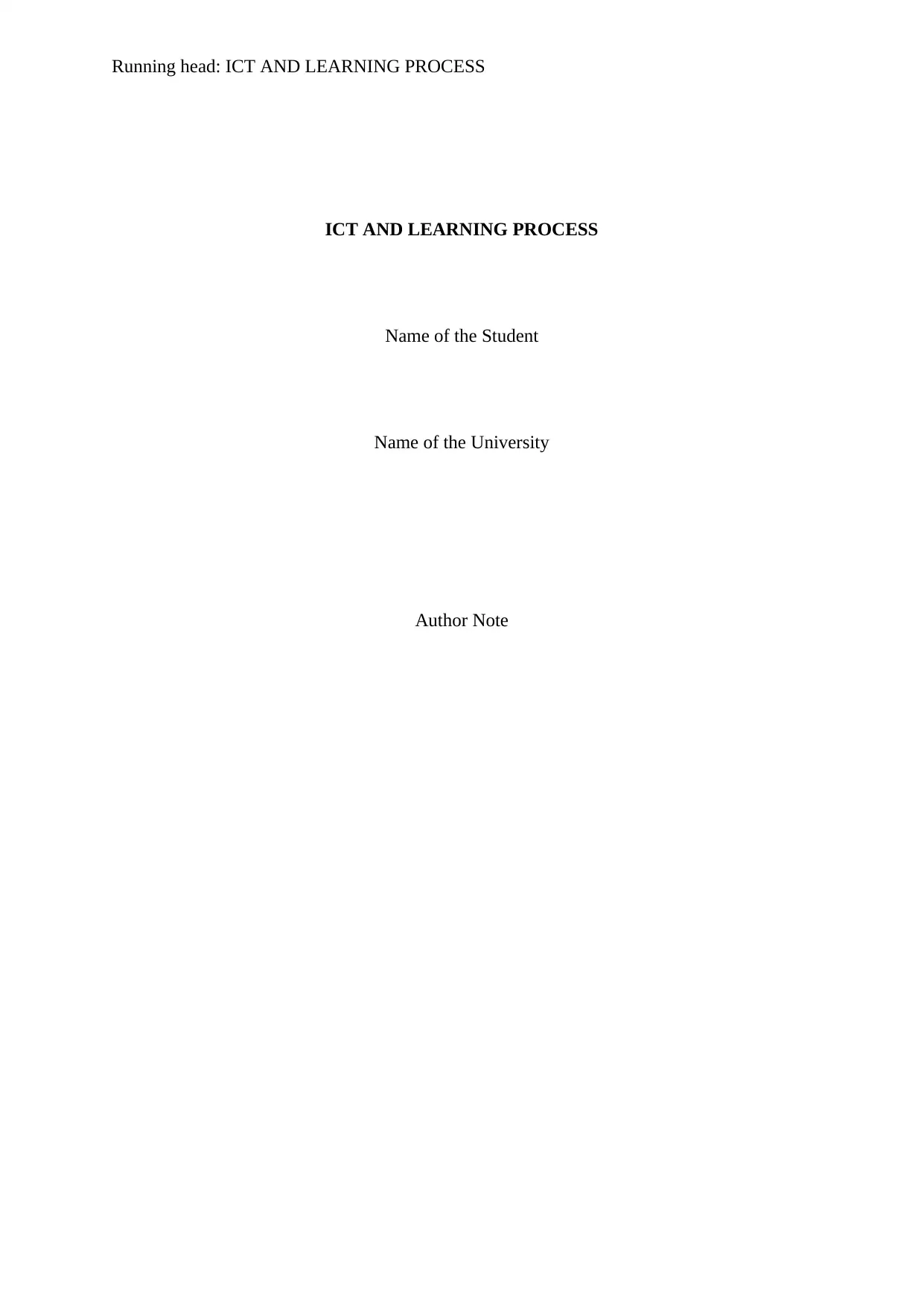
Running head: ICT AND LEARNING PROCESS
ICT AND LEARNING PROCESS
Name of the Student
Name of the University
Author Note
ICT AND LEARNING PROCESS
Name of the Student
Name of the University
Author Note
Paraphrase This Document
Need a fresh take? Get an instant paraphrase of this document with our AI Paraphraser
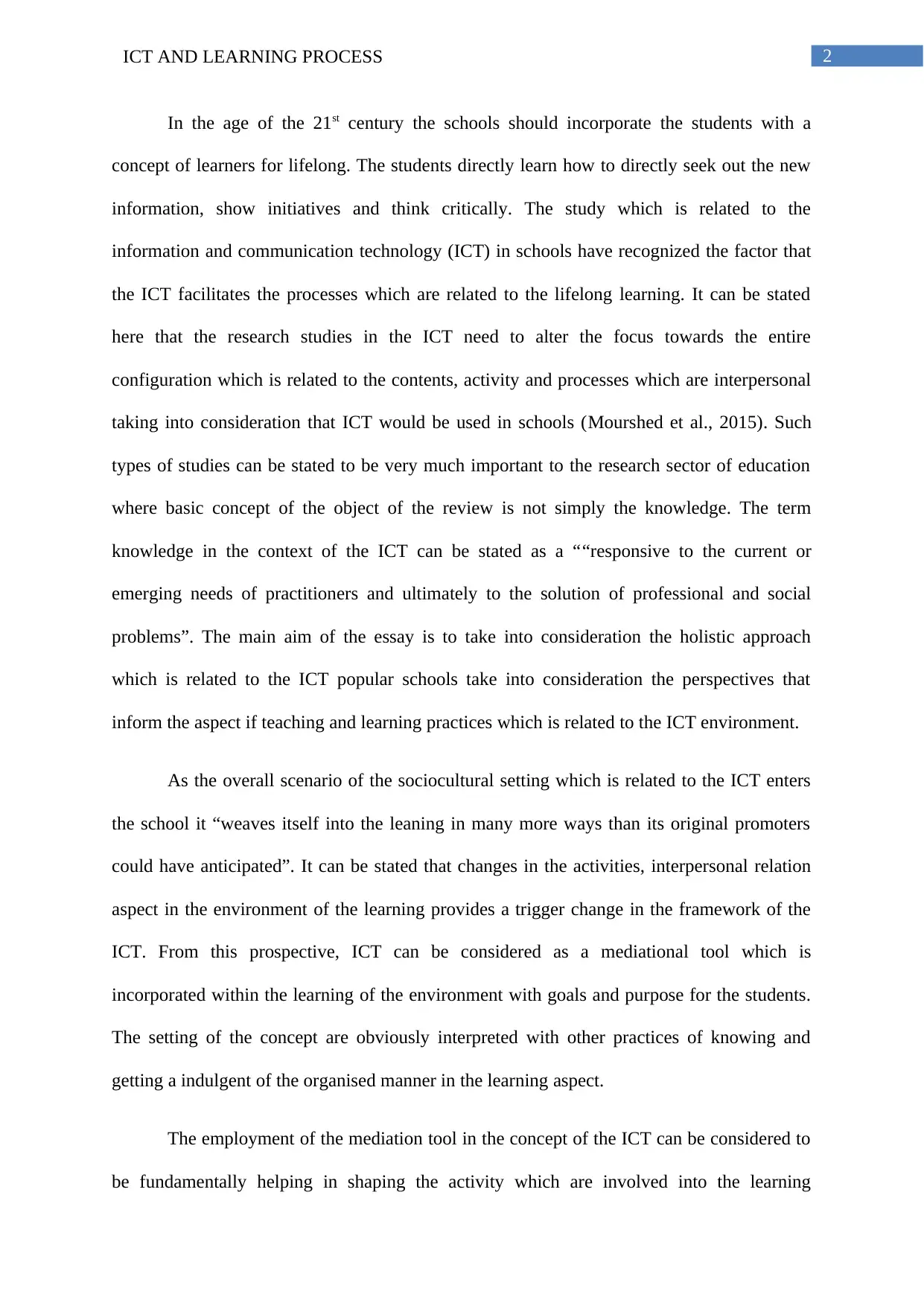
2ICT AND LEARNING PROCESS
In the age of the 21st century the schools should incorporate the students with a
concept of learners for lifelong. The students directly learn how to directly seek out the new
information, show initiatives and think critically. The study which is related to the
information and communication technology (ICT) in schools have recognized the factor that
the ICT facilitates the processes which are related to the lifelong learning. It can be stated
here that the research studies in the ICT need to alter the focus towards the entire
configuration which is related to the contents, activity and processes which are interpersonal
taking into consideration that ICT would be used in schools (Mourshed et al., 2015). Such
types of studies can be stated to be very much important to the research sector of education
where basic concept of the object of the review is not simply the knowledge. The term
knowledge in the context of the ICT can be stated as a ““responsive to the current or
emerging needs of practitioners and ultimately to the solution of professional and social
problems”. The main aim of the essay is to take into consideration the holistic approach
which is related to the ICT popular schools take into consideration the perspectives that
inform the aspect if teaching and learning practices which is related to the ICT environment.
As the overall scenario of the sociocultural setting which is related to the ICT enters
the school it “weaves itself into the leaning in many more ways than its original promoters
could have anticipated”. It can be stated that changes in the activities, interpersonal relation
aspect in the environment of the learning provides a trigger change in the framework of the
ICT. From this prospective, ICT can be considered as a mediational tool which is
incorporated within the learning of the environment with goals and purpose for the students.
The setting of the concept are obviously interpreted with other practices of knowing and
getting a indulgent of the organised manner in the learning aspect.
The employment of the mediation tool in the concept of the ICT can be considered to
be fundamentally helping in shaping the activity which are involved into the learning
In the age of the 21st century the schools should incorporate the students with a
concept of learners for lifelong. The students directly learn how to directly seek out the new
information, show initiatives and think critically. The study which is related to the
information and communication technology (ICT) in schools have recognized the factor that
the ICT facilitates the processes which are related to the lifelong learning. It can be stated
here that the research studies in the ICT need to alter the focus towards the entire
configuration which is related to the contents, activity and processes which are interpersonal
taking into consideration that ICT would be used in schools (Mourshed et al., 2015). Such
types of studies can be stated to be very much important to the research sector of education
where basic concept of the object of the review is not simply the knowledge. The term
knowledge in the context of the ICT can be stated as a ““responsive to the current or
emerging needs of practitioners and ultimately to the solution of professional and social
problems”. The main aim of the essay is to take into consideration the holistic approach
which is related to the ICT popular schools take into consideration the perspectives that
inform the aspect if teaching and learning practices which is related to the ICT environment.
As the overall scenario of the sociocultural setting which is related to the ICT enters
the school it “weaves itself into the leaning in many more ways than its original promoters
could have anticipated”. It can be stated that changes in the activities, interpersonal relation
aspect in the environment of the learning provides a trigger change in the framework of the
ICT. From this prospective, ICT can be considered as a mediational tool which is
incorporated within the learning of the environment with goals and purpose for the students.
The setting of the concept are obviously interpreted with other practices of knowing and
getting a indulgent of the organised manner in the learning aspect.
The employment of the mediation tool in the concept of the ICT can be considered to
be fundamentally helping in shaping the activity which are involved into the learning
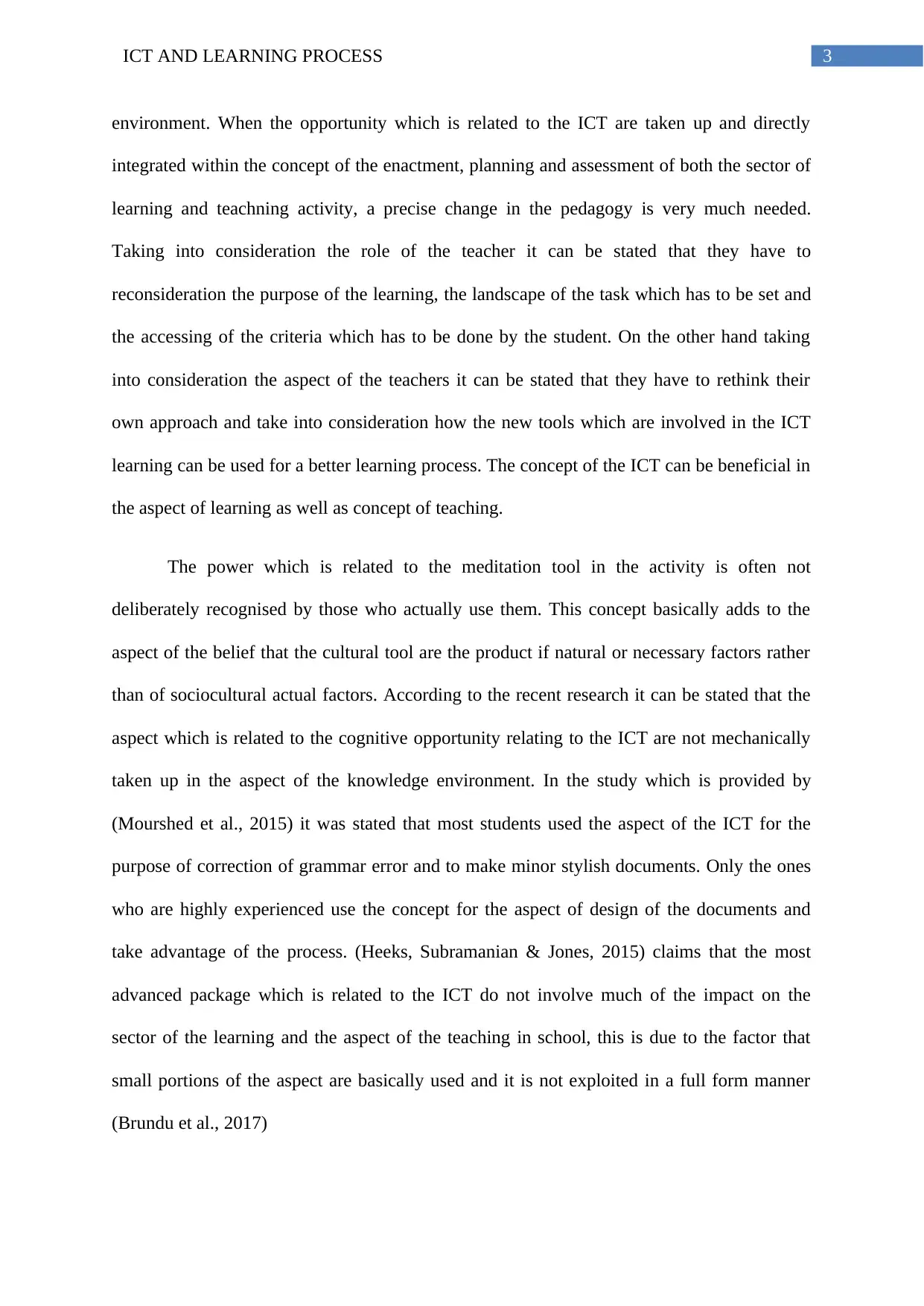
3ICT AND LEARNING PROCESS
environment. When the opportunity which is related to the ICT are taken up and directly
integrated within the concept of the enactment, planning and assessment of both the sector of
learning and teachning activity, a precise change in the pedagogy is very much needed.
Taking into consideration the role of the teacher it can be stated that they have to
reconsideration the purpose of the learning, the landscape of the task which has to be set and
the accessing of the criteria which has to be done by the student. On the other hand taking
into consideration the aspect of the teachers it can be stated that they have to rethink their
own approach and take into consideration how the new tools which are involved in the ICT
learning can be used for a better learning process. The concept of the ICT can be beneficial in
the aspect of learning as well as concept of teaching.
The power which is related to the meditation tool in the activity is often not
deliberately recognised by those who actually use them. This concept basically adds to the
aspect of the belief that the cultural tool are the product if natural or necessary factors rather
than of sociocultural actual factors. According to the recent research it can be stated that the
aspect which is related to the cognitive opportunity relating to the ICT are not mechanically
taken up in the aspect of the knowledge environment. In the study which is provided by
(Mourshed et al., 2015) it was stated that most students used the aspect of the ICT for the
purpose of correction of grammar error and to make minor stylish documents. Only the ones
who are highly experienced use the concept for the aspect of design of the documents and
take advantage of the process. (Heeks, Subramanian & Jones, 2015) claims that the most
advanced package which is related to the ICT do not involve much of the impact on the
sector of the learning and the aspect of the teaching in school, this is due to the factor that
small portions of the aspect are basically used and it is not exploited in a full form manner
(Brundu et al., 2017)
environment. When the opportunity which is related to the ICT are taken up and directly
integrated within the concept of the enactment, planning and assessment of both the sector of
learning and teachning activity, a precise change in the pedagogy is very much needed.
Taking into consideration the role of the teacher it can be stated that they have to
reconsideration the purpose of the learning, the landscape of the task which has to be set and
the accessing of the criteria which has to be done by the student. On the other hand taking
into consideration the aspect of the teachers it can be stated that they have to rethink their
own approach and take into consideration how the new tools which are involved in the ICT
learning can be used for a better learning process. The concept of the ICT can be beneficial in
the aspect of learning as well as concept of teaching.
The power which is related to the meditation tool in the activity is often not
deliberately recognised by those who actually use them. This concept basically adds to the
aspect of the belief that the cultural tool are the product if natural or necessary factors rather
than of sociocultural actual factors. According to the recent research it can be stated that the
aspect which is related to the cognitive opportunity relating to the ICT are not mechanically
taken up in the aspect of the knowledge environment. In the study which is provided by
(Mourshed et al., 2015) it was stated that most students used the aspect of the ICT for the
purpose of correction of grammar error and to make minor stylish documents. Only the ones
who are highly experienced use the concept for the aspect of design of the documents and
take advantage of the process. (Heeks, Subramanian & Jones, 2015) claims that the most
advanced package which is related to the ICT do not involve much of the impact on the
sector of the learning and the aspect of the teaching in school, this is due to the factor that
small portions of the aspect are basically used and it is not exploited in a full form manner
(Brundu et al., 2017)
⊘ This is a preview!⊘
Do you want full access?
Subscribe today to unlock all pages.

Trusted by 1+ million students worldwide
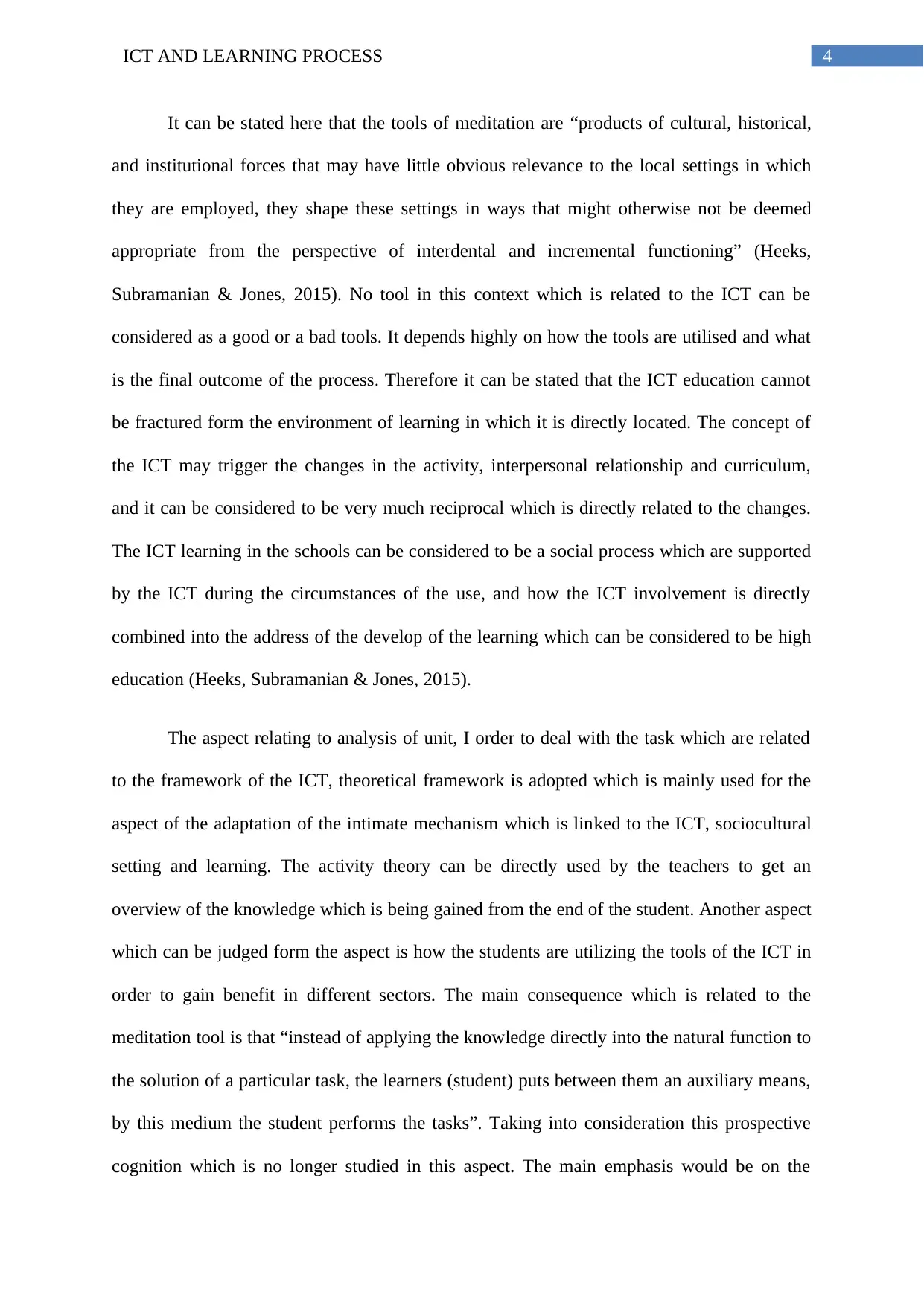
4ICT AND LEARNING PROCESS
It can be stated here that the tools of meditation are “products of cultural, historical,
and institutional forces that may have little obvious relevance to the local settings in which
they are employed, they shape these settings in ways that might otherwise not be deemed
appropriate from the perspective of interdental and incremental functioning” (Heeks,
Subramanian & Jones, 2015). No tool in this context which is related to the ICT can be
considered as a good or a bad tools. It depends highly on how the tools are utilised and what
is the final outcome of the process. Therefore it can be stated that the ICT education cannot
be fractured form the environment of learning in which it is directly located. The concept of
the ICT may trigger the changes in the activity, interpersonal relationship and curriculum,
and it can be considered to be very much reciprocal which is directly related to the changes.
The ICT learning in the schools can be considered to be a social process which are supported
by the ICT during the circumstances of the use, and how the ICT involvement is directly
combined into the address of the develop of the learning which can be considered to be high
education (Heeks, Subramanian & Jones, 2015).
The aspect relating to analysis of unit, I order to deal with the task which are related
to the framework of the ICT, theoretical framework is adopted which is mainly used for the
aspect of the adaptation of the intimate mechanism which is linked to the ICT, sociocultural
setting and learning. The activity theory can be directly used by the teachers to get an
overview of the knowledge which is being gained from the end of the student. Another aspect
which can be judged form the aspect is how the students are utilizing the tools of the ICT in
order to gain benefit in different sectors. The main consequence which is related to the
meditation tool is that “instead of applying the knowledge directly into the natural function to
the solution of a particular task, the learners (student) puts between them an auxiliary means,
by this medium the student performs the tasks”. Taking into consideration this prospective
cognition which is no longer studied in this aspect. The main emphasis would be on the
It can be stated here that the tools of meditation are “products of cultural, historical,
and institutional forces that may have little obvious relevance to the local settings in which
they are employed, they shape these settings in ways that might otherwise not be deemed
appropriate from the perspective of interdental and incremental functioning” (Heeks,
Subramanian & Jones, 2015). No tool in this context which is related to the ICT can be
considered as a good or a bad tools. It depends highly on how the tools are utilised and what
is the final outcome of the process. Therefore it can be stated that the ICT education cannot
be fractured form the environment of learning in which it is directly located. The concept of
the ICT may trigger the changes in the activity, interpersonal relationship and curriculum,
and it can be considered to be very much reciprocal which is directly related to the changes.
The ICT learning in the schools can be considered to be a social process which are supported
by the ICT during the circumstances of the use, and how the ICT involvement is directly
combined into the address of the develop of the learning which can be considered to be high
education (Heeks, Subramanian & Jones, 2015).
The aspect relating to analysis of unit, I order to deal with the task which are related
to the framework of the ICT, theoretical framework is adopted which is mainly used for the
aspect of the adaptation of the intimate mechanism which is linked to the ICT, sociocultural
setting and learning. The activity theory can be directly used by the teachers to get an
overview of the knowledge which is being gained from the end of the student. Another aspect
which can be judged form the aspect is how the students are utilizing the tools of the ICT in
order to gain benefit in different sectors. The main consequence which is related to the
meditation tool is that “instead of applying the knowledge directly into the natural function to
the solution of a particular task, the learners (student) puts between them an auxiliary means,
by this medium the student performs the tasks”. Taking into consideration this prospective
cognition which is no longer studied in this aspect. The main emphasis would be on the
Paraphrase This Document
Need a fresh take? Get an instant paraphrase of this document with our AI Paraphraser
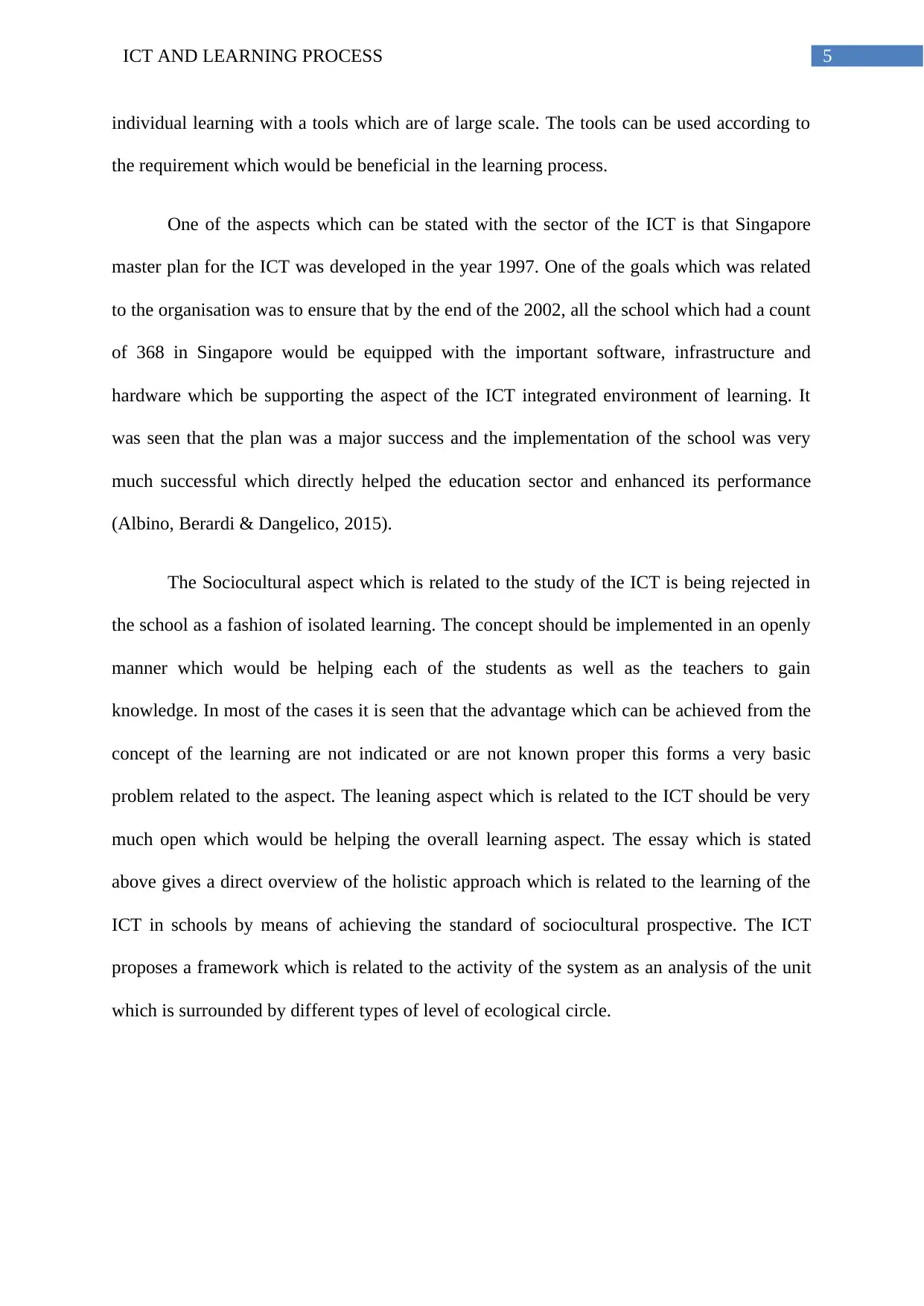
5ICT AND LEARNING PROCESS
individual learning with a tools which are of large scale. The tools can be used according to
the requirement which would be beneficial in the learning process.
One of the aspects which can be stated with the sector of the ICT is that Singapore
master plan for the ICT was developed in the year 1997. One of the goals which was related
to the organisation was to ensure that by the end of the 2002, all the school which had a count
of 368 in Singapore would be equipped with the important software, infrastructure and
hardware which be supporting the aspect of the ICT integrated environment of learning. It
was seen that the plan was a major success and the implementation of the school was very
much successful which directly helped the education sector and enhanced its performance
(Albino, Berardi & Dangelico, 2015).
The Sociocultural aspect which is related to the study of the ICT is being rejected in
the school as a fashion of isolated learning. The concept should be implemented in an openly
manner which would be helping each of the students as well as the teachers to gain
knowledge. In most of the cases it is seen that the advantage which can be achieved from the
concept of the learning are not indicated or are not known proper this forms a very basic
problem related to the aspect. The leaning aspect which is related to the ICT should be very
much open which would be helping the overall learning aspect. The essay which is stated
above gives a direct overview of the holistic approach which is related to the learning of the
ICT in schools by means of achieving the standard of sociocultural prospective. The ICT
proposes a framework which is related to the activity of the system as an analysis of the unit
which is surrounded by different types of level of ecological circle.
individual learning with a tools which are of large scale. The tools can be used according to
the requirement which would be beneficial in the learning process.
One of the aspects which can be stated with the sector of the ICT is that Singapore
master plan for the ICT was developed in the year 1997. One of the goals which was related
to the organisation was to ensure that by the end of the 2002, all the school which had a count
of 368 in Singapore would be equipped with the important software, infrastructure and
hardware which be supporting the aspect of the ICT integrated environment of learning. It
was seen that the plan was a major success and the implementation of the school was very
much successful which directly helped the education sector and enhanced its performance
(Albino, Berardi & Dangelico, 2015).
The Sociocultural aspect which is related to the study of the ICT is being rejected in
the school as a fashion of isolated learning. The concept should be implemented in an openly
manner which would be helping each of the students as well as the teachers to gain
knowledge. In most of the cases it is seen that the advantage which can be achieved from the
concept of the learning are not indicated or are not known proper this forms a very basic
problem related to the aspect. The leaning aspect which is related to the ICT should be very
much open which would be helping the overall learning aspect. The essay which is stated
above gives a direct overview of the holistic approach which is related to the learning of the
ICT in schools by means of achieving the standard of sociocultural prospective. The ICT
proposes a framework which is related to the activity of the system as an analysis of the unit
which is surrounded by different types of level of ecological circle.
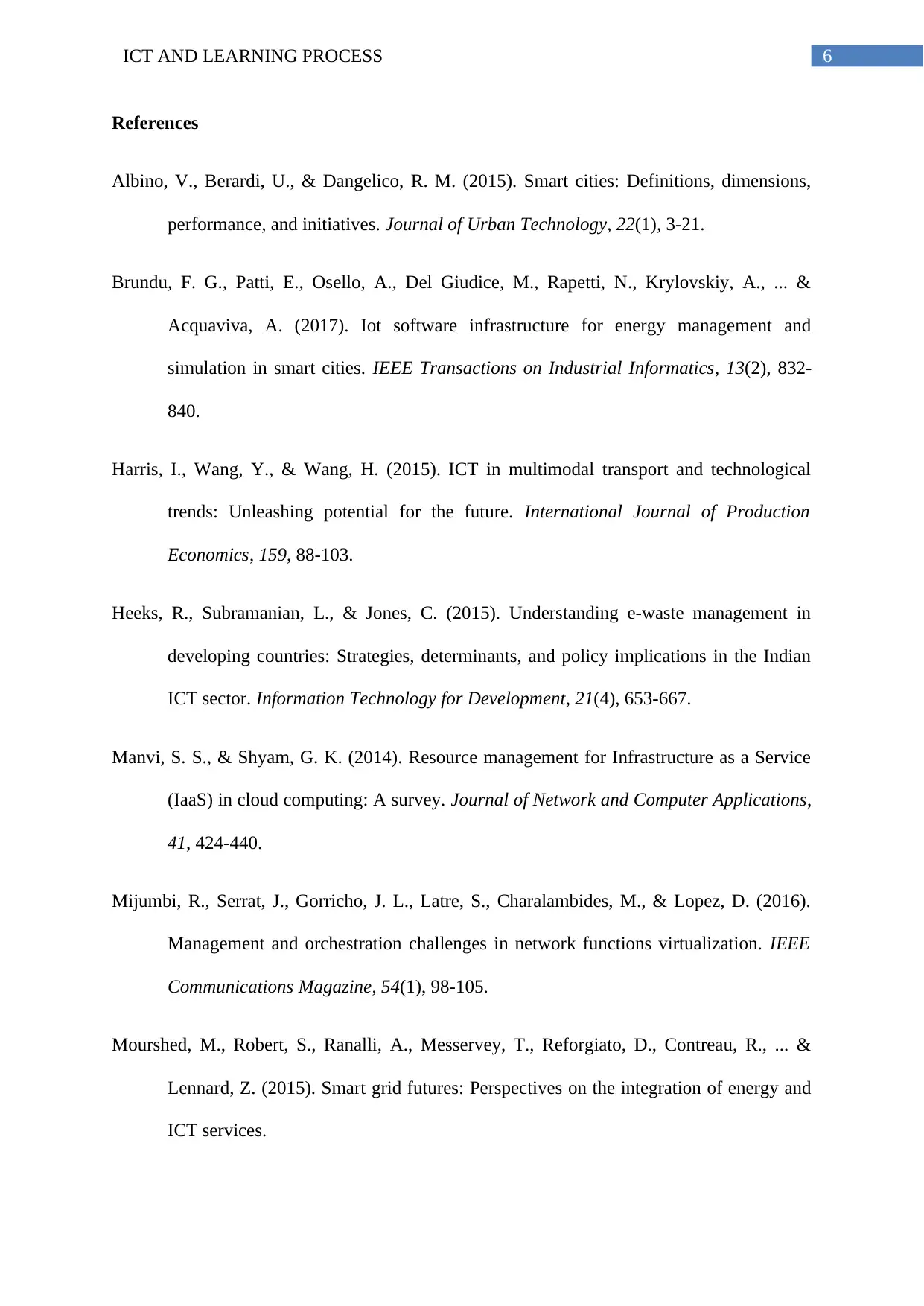
6ICT AND LEARNING PROCESS
References
Albino, V., Berardi, U., & Dangelico, R. M. (2015). Smart cities: Definitions, dimensions,
performance, and initiatives. Journal of Urban Technology, 22(1), 3-21.
Brundu, F. G., Patti, E., Osello, A., Del Giudice, M., Rapetti, N., Krylovskiy, A., ... &
Acquaviva, A. (2017). Iot software infrastructure for energy management and
simulation in smart cities. IEEE Transactions on Industrial Informatics, 13(2), 832-
840.
Harris, I., Wang, Y., & Wang, H. (2015). ICT in multimodal transport and technological
trends: Unleashing potential for the future. International Journal of Production
Economics, 159, 88-103.
Heeks, R., Subramanian, L., & Jones, C. (2015). Understanding e-waste management in
developing countries: Strategies, determinants, and policy implications in the Indian
ICT sector. Information Technology for Development, 21(4), 653-667.
Manvi, S. S., & Shyam, G. K. (2014). Resource management for Infrastructure as a Service
(IaaS) in cloud computing: A survey. Journal of Network and Computer Applications,
41, 424-440.
Mijumbi, R., Serrat, J., Gorricho, J. L., Latre, S., Charalambides, M., & Lopez, D. (2016).
Management and orchestration challenges in network functions virtualization. IEEE
Communications Magazine, 54(1), 98-105.
Mourshed, M., Robert, S., Ranalli, A., Messervey, T., Reforgiato, D., Contreau, R., ... &
Lennard, Z. (2015). Smart grid futures: Perspectives on the integration of energy and
ICT services.
References
Albino, V., Berardi, U., & Dangelico, R. M. (2015). Smart cities: Definitions, dimensions,
performance, and initiatives. Journal of Urban Technology, 22(1), 3-21.
Brundu, F. G., Patti, E., Osello, A., Del Giudice, M., Rapetti, N., Krylovskiy, A., ... &
Acquaviva, A. (2017). Iot software infrastructure for energy management and
simulation in smart cities. IEEE Transactions on Industrial Informatics, 13(2), 832-
840.
Harris, I., Wang, Y., & Wang, H. (2015). ICT in multimodal transport and technological
trends: Unleashing potential for the future. International Journal of Production
Economics, 159, 88-103.
Heeks, R., Subramanian, L., & Jones, C. (2015). Understanding e-waste management in
developing countries: Strategies, determinants, and policy implications in the Indian
ICT sector. Information Technology for Development, 21(4), 653-667.
Manvi, S. S., & Shyam, G. K. (2014). Resource management for Infrastructure as a Service
(IaaS) in cloud computing: A survey. Journal of Network and Computer Applications,
41, 424-440.
Mijumbi, R., Serrat, J., Gorricho, J. L., Latre, S., Charalambides, M., & Lopez, D. (2016).
Management and orchestration challenges in network functions virtualization. IEEE
Communications Magazine, 54(1), 98-105.
Mourshed, M., Robert, S., Ranalli, A., Messervey, T., Reforgiato, D., Contreau, R., ... &
Lennard, Z. (2015). Smart grid futures: Perspectives on the integration of energy and
ICT services.
⊘ This is a preview!⊘
Do you want full access?
Subscribe today to unlock all pages.

Trusted by 1+ million students worldwide
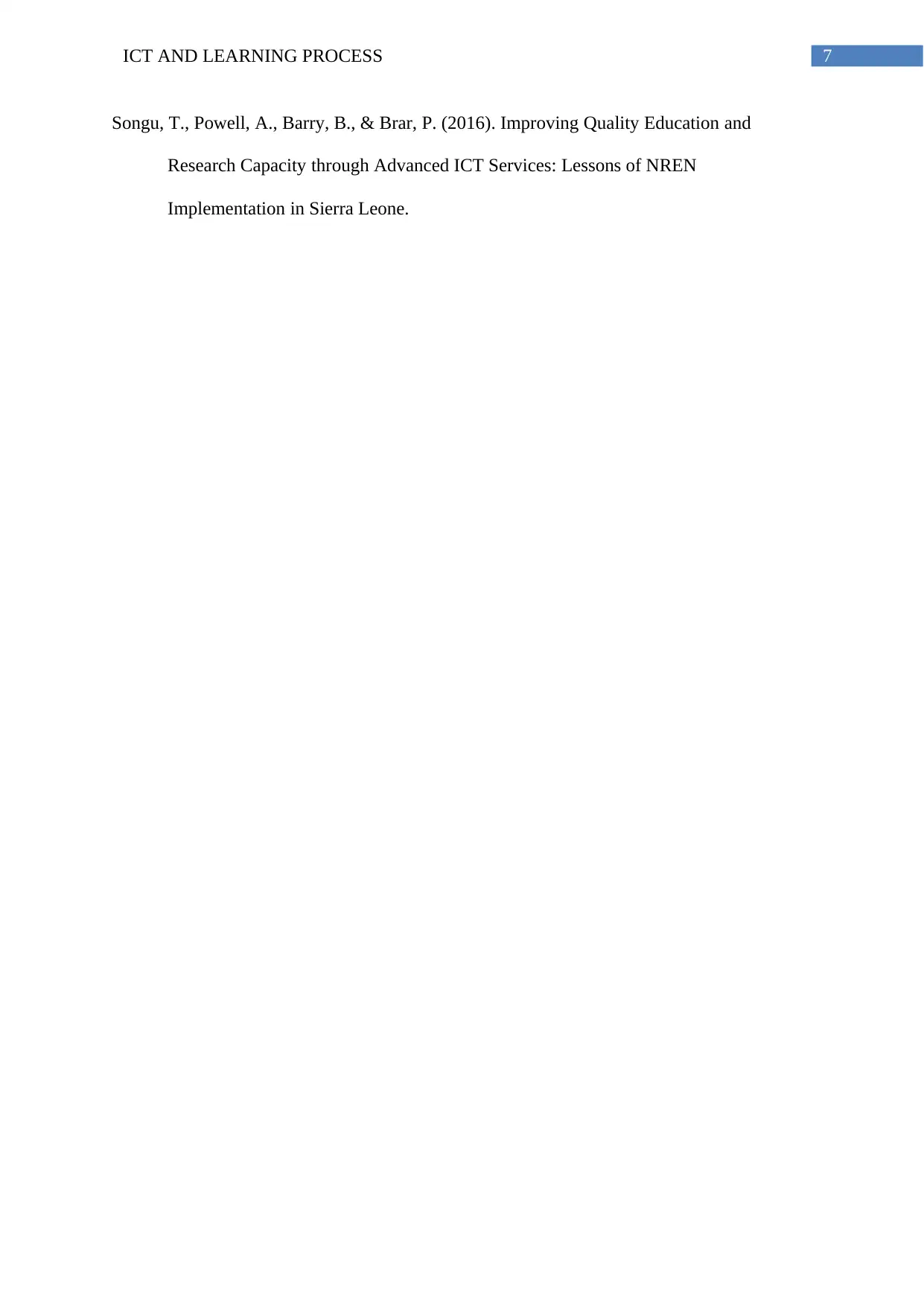
7ICT AND LEARNING PROCESS
Songu, T., Powell, A., Barry, B., & Brar, P. (2016). Improving Quality Education and
Research Capacity through Advanced ICT Services: Lessons of NREN
Implementation in Sierra Leone.
Songu, T., Powell, A., Barry, B., & Brar, P. (2016). Improving Quality Education and
Research Capacity through Advanced ICT Services: Lessons of NREN
Implementation in Sierra Leone.
1 out of 7
Related Documents
Your All-in-One AI-Powered Toolkit for Academic Success.
+13062052269
info@desklib.com
Available 24*7 on WhatsApp / Email
![[object Object]](/_next/static/media/star-bottom.7253800d.svg)
Unlock your academic potential
Copyright © 2020–2026 A2Z Services. All Rights Reserved. Developed and managed by ZUCOL.





